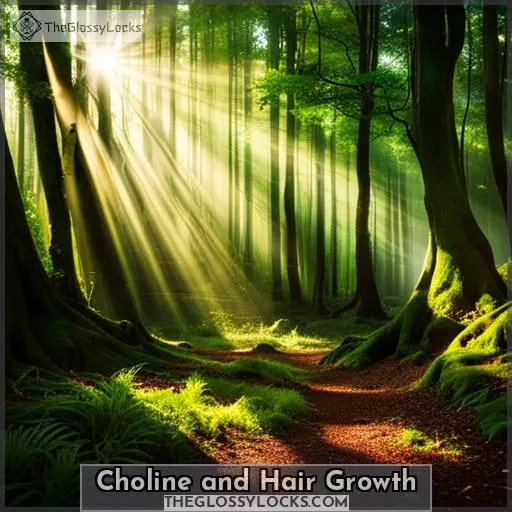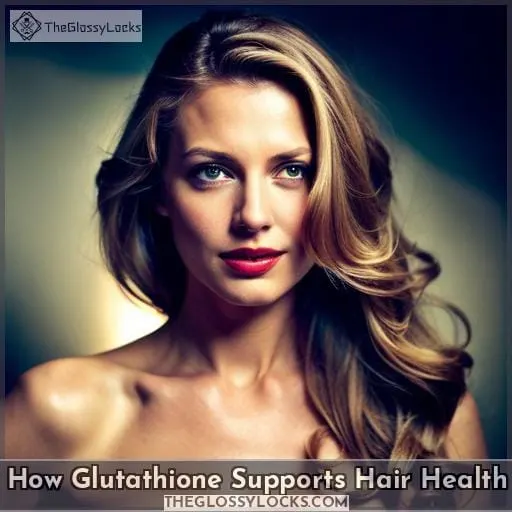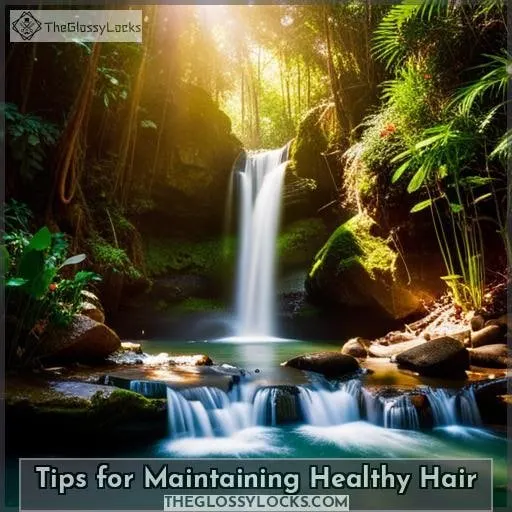This site is supported by our readers. We may earn a commission, at no cost to you, if you purchase through links.
 Ah, the elusive dream of perfect hair. We’ve all wished for it at some point in our lives – shiny and glossy locks that bounce with every step we take. Well, look no further than L-Glutathione to help you unlock the secret to healthier hair! This natural compound is a powerhouse when it comes to providing essential nutrients needed for healthy tresses.
Ah, the elusive dream of perfect hair. We’ve all wished for it at some point in our lives – shiny and glossy locks that bounce with every step we take. Well, look no further than L-Glutathione to help you unlock the secret to healthier hair! This natural compound is a powerhouse when it comes to providing essential nutrients needed for healthy tresses.
Table Of Contents
- Key Takeaways
- What is Glutathione?
- How Does Glutathione Benefit Hair Health?
- How to Increase Glutathione Levels in the Body?
- The Role of B Vitamins in Healthy Hair
- The Importance of Zinc for Hair Health
- Choline and Hair Growth
- How Glutathione Supports Hair Health
- Tips for Maintaining Healthy Hair
- Potential Side Effects and Precautions
- Consultation With a Healthcare Provider
- Conclusion
Key Takeaways
- Glutathione is a natural liver-produced antioxidant that can protect against hair loss and promote hair growth.
- Increasing the intake of sulfur-containing amino acids in the diet can help boost glutathione levels for better hair health.
- Supporting nutrients like antioxidant vitamins (C and E), zinc, biotin, and B vitamins are important for maintaining strong and healthy hair.
- Proper hair care routine, balanced nutrition, and stress management are crucial for maintaining healthy hair.
What is Glutathione?
You may have heard of glutathione, the master antioxidant that can help reduce oxidative stress and support detoxification – both of which are important for healthy hair. Glutathione is naturally produced in the liver from cysteine, glutamate, and glycine.
It helps protect cells from free radicals like toxins in our environment or those generated by disease processes such as cancer or HIV/AIDS. It also supports cellular protection against damage caused by chronic diseases like diabetes.
In addition to its antioxidative effects on health conditions such as Parkinson’s Disease and skin aging signs, glutathione also plays a role in maintaining your scalp health through the detoxification process.
Taking supplements containing ingredients known to boost glutathione levels, such as vitamin C and E, along with other natural sources including curcumin and N-acetylcysteine, can be helpful too when trying to combat oxidative stress-related issues resulting from poor dietary habits or environmental pollutants impacting your overall hair quality adversely over time.
How Does Glutathione Benefit Hair Health?
Glutathione is an antioxidant that plays a key role in hair health. It has the potential to reduce inflammation and oxidative stress, which can help protect against hair loss associated with alopecia. By supplementing your diet with glutathione or foods rich in sulfur-containing amino acids, you may be able to improve the overall health of your scalp and promote healthy hair growth.
Reduces Oxidative Stress
Through its powerful antioxidant properties, glutathione can help reduce the oxidative stress linked to androgenetic alopecia. It boosts hair strength, fights aging effects from environmental factors, and encourages hair growth.
Antioxidants in glutathione protect cells from damage while also managing oxidative stress levels for healthier locks.
Promotes Hair Growth
By taking glutathione, you can help promote hair growth and reduce oxidative stress. Hair health is dependent on the right nutrition and certain supplements to support it. Glutathione helps counteract damage from environmental toxins that lead to hair loss by preventing oxidation of cells in the scalp.
It also supports healthy cell division for faster regrowth of new strands while strengthening existing ones with its antioxidant action, making them less prone to breakage or split ends over time.
Strengthens Hair Shaft
With its powerful antioxidant capabilities, glutathione helps repair and strengthen the hair shaft. It boosts protein production, which is essential for healthy locks, and also prevents breakage. Glutathione supports scalp health with nutrient-rich benefits like vitamins C, E, and B6 to promote strong strands from root to tip.
How to Increase Glutathione Levels in the Body?
Increasing glutathione levels in the body can have a positive effect on hair health. There are two main ways to increase glutathione: dietary sources and supplementation options.
Dietary Sources of Glutathione
You can boost your glutathione levels by incorporating certain foods into your diet. Opt for sulfur-containing amino acids from meats, garlic, broccoli, asparagus, and spinach. Get antioxidant vitamins such as Vitamin C and E from fruits like oranges or kiwis to support cellular protection against oxidative stress.
Supplement with lifestyle nutritional brands that are free of dietary restrictions if needed.
Supplementation Options
Boosting your body’s glutathione levels can be done through supplementation, so don’t let life pass you by! Supplement types include injectable forms, capsules, and powders.
It is important to note that oral supplements are not as effective as other forms because they are broken down in the stomach before absorption occurs. Effects generally relate to increased antioxidant protection and improved liver health for detoxification purposes.
Risks associated with supplementation vary depending on potency and safety regulations, which differ between countries. Complications could include overdose or drug interactions if taken without medical advice from a doctor beforehand.
Efficacy of these supplements also varies greatly based on quality control standards.
L-glutathione benefits for hair growth have been suggested in some studies, making it an appealing option when looking at natural remedies against alopecia symptoms related to oxidative stress levels too high within cells.
The Role of B Vitamins in Healthy Hair
Are you looking to keep your hair healthy and strong? B vitamins are essential for this, with biotin, vitamin B12, and other members of the family playing key roles.
Biotin
Biotin is an essential B vitamin that helps your body convert food into energy. It may help enhance hair health by strengthening the structure of keratin and increasing elasticity to reduce breakage. Dairy-based whole foods are a great source of biotin, while zinc found in beef, pumpkin seeds, and cashews can support healthy scalp function.
Stress can weaken hair follicles, so it’s important to practice self-care for overall well-being too! Additionally, l-glutathione benefits for hair include reducing fine lines on the scalp, which has been linked with improved growth cycles as well as better texture and shine.
Vitamin B12
Crucial for cell metabolism, Vitamin B12 is a must-have in your hair health arsenal. Supplementation supports healthy hair growth by boosting energy levels and fighting oxidative stress. It works synergistically with glutathione to protect against wrinkles and loss of skin elasticity, making it a key beauty-from-within factor.
Other B Vitamins
Getting enough B vitamins in your diet can help maintain healthy, strong hair. Vitamin B5 supports the production of keratin and helps strengthen follicles. Vitamin B6 assists with hormone regulation related to hair growth. Vitamin B7 supports oil gland secretion for scalp health.
Additionally, dietary zinc is important for preventing oxidative stress-induced damage on the scalp. Choline plays a role in improving circulation, which increases nutrient delivery to promote stronger locks.
L-glutathione benefits hair by boosting antioxidant activity, which helps reduce inflammation and protect against free radical damage.
The Importance of Zinc for Hair Health
It’s essential to understand the importance of zinc for hair health. Zinc plays a key role in regulating hormones, which can impact hair growth and development. It also aids in cell production, helping to keep your scalp healthy and nourished with nutrient-rich blood flow.
Additionally, zinc helps maintain oxidative balance throughout the body by fighting free radicals that lead to inflammation and tissue damage—two factors that contribute significantly towards thinning hair or pattern baldness.
To get enough dietary zinc into your diet, you should focus on eating foods like:
- Oysters: contains 74 milligrams per 3-ounce serving
- Lean beef: 5 milligrams per 3-ounce serving
- Crabmeat: 6 milligrams per 3-ounce portion
- Shrimp/lobster: 3 milligrams each (3 ounces)
- Fortified Breakfast Cereal: 2-6 mg/serving
With such an array of benefits, it’s clear why getting enough daily intake is so important for overall health and nutrition support, specifically when it comes to promoting healthy hair growth!
Choline and Hair Growth
You may have heard that choline is important for hair growth, but do you know why? Choline has many benefits when it comes to healthy hair. It helps the body create l-glutathione, an antioxidant that improves oxidative impact on the scalp and follicles.
This helps protect against damage from free radicals while nourishing your hair with essential vitamins and minerals for optimal vitality.
Additionally, choline encourages cell repair in the body, which can help strengthen weakened follicles due to genetics or stressors like environmental toxins or UV exposure. Furthermore, regular intake of choline aids in hormone production necessary for healthy blood circulation.
By incorporating dietary sources of this nutrient, such as eggs, beef liver, and Brussels sprouts, into a balanced diet, you can unlock its full potential in stimulating strong and lustrous locks!
How Glutathione Supports Hair Health
Recent studies have revealed that glutathione may reduce oxidative stress linked to androgenetic alopecia, with some findings suggesting it can improve hair density by up to 30%. Glutathione for skin is thought to enhance beauty, help protect from sun damage, and reduce age-related wrinkles.
It’s also beneficial in improving energy levels due to its ability to counteract oxidative stress.
Additionally, lifestyle changes such as regular exercise or improved nutrition can help promote healthy hair growth along with taking a supplement containing glutathione. Glutathione supplements are said to support the body’s natural detoxification process, which helps rid the scalp of toxins that cause inflammation.
This inflammation can lead to diminished circulation, a common contributor to hair loss prevention.
Improved circulation allows nutrients like glucose and oxygen, essential for cellular energy production, to reach cells more efficiently, aiding in healthier-looking locks! Not only does this antioxidant boost overall health, but it also promotes thicker, fuller tresses too!
Tips for Maintaining Healthy Hair
Maintaining healthy hair requires a combination of proper care, balanced nutrition and hydration, as well as stress management. With the right routine and attention to diet and lifestyle factors, you can keep your hair looking its best.
Proper Hair Care Routine
To maintain healthy hair, it’s important to have a proper hair care routine. Hair nutrition, scalp health, and supplements all play a role. Styling should be done with care, and loss prevention methods are essential for long-term success.
Glutathione can aid in cell regeneration and protect against damage from styling products.
| Nutrition | Scalp Health | Supplements & Products |
|---|---|---|
| Eating foods rich in vitamins A & C | Massaging to promote circulation | Natural shampoos or conditioners |
| – | – | Avoiding heat/chemical-based treatments |
| – | Taking glutathione as an antioxidant | – |
Balanced Diet and Hydration
Eating a balanced diet with plenty of nutrients, along with proper hydration, can help maintain healthy hair by providing the body’s cells antioxidants like glutathione to fight off oxidative stress.
Eating nutrient-rich foods, including fruits and vegetables, helps provide essential vitamins and minerals for strong hair growth.
Staying well hydrated is key; water helps flush out toxins that can damage follicles, leading to thinning or loss.
Getting adequate dietary support through good nutrition habits builds up the immune system, which also benefits scalp health.
Adopting a nutritional lifestyle filled with natural sources will ensure optimal l-glutathione benefits for hair maintenance as you age gracefully!
Stress Management
Managing stress levels can be key to maintaining healthy hair, so don’t forget to take time for yourself – after all, a stitch in time saves nine! Try scalp massages and mindfulness meditation for stress reduction.
Hair supplements with l-glutathione may also help reduce oxidative damage. Explore relaxation techniques like yoga or tai chi too – their benefits are undeniable! Learning how to manage your emotions is essential; it will not only benefit your hair but also improve overall well-being.
Avoiding Heat and Chemical Damage
Limit your use of heating tools and chemical treatments, as these can lead to oxidative stress in the scalp, which may contribute to hair thinning. Invest in quality heat protection products for styling and opt for natural alternatives over harsh chemicals when possible.
Develop haircare routines that focus on maintaining healthy locks while avoiding long-term damage from regular styling habits.
Use choline-rich foods such as eggs, fish, meats, nuts, or leafy greens to support hair health from within. If you’re looking to supplement your diet with this powerful antioxidant, work with a contract manufacturer who specializes in l-glutathione benefits for hair and diabetes prevention.
Potential Side Effects and Precautions
When considering the use of glutathione for hair health, it is important to be aware of potential side effects such as allergic reactions, drug interactions, and safety concerns during pregnancy and breastfeeding.
Before taking any supplement or medication containing glutathione, it’s essential to consult a qualified medical professional about your individual risks.
Allergic Reactions
Be aware that taking glutathione supplements may cause allergic reactions in some people. It is important to monitor scalp health and hair shedding, as well as consider the various causes of hair loss such as insulin resistance, B vitamin deficiency, pantothenic acid deficiency, and Parkinson’s Disease.
Before adding glutathione to your routine, it is always best to consult with a primary care doctor for proper guidance and potential interactions with medications.
Drug Interactions
Take caution when using glutathione supplements, as they may interact with certain drugs. These reactions can be unexpected and cause serious health risks. Before taking any hair supplement containing glutathione, consult your doctor to discuss possible interactions with medications you are currently taking.
Glutathione’s safety needs to be taken into account for optimal hair health; understanding potential interactions is the first step in ensuring that you get the most out of this powerful antioxidant without compromising your overall well-being.
Pregnancy and Breastfeeding
It is unknown what effect glutathione may have during pregnancy or breastfeeding, so it’s best to avoid supplementation unless recommended by a doctor. Pregnant and nursing mothers should consider other forms of nutritional support for hair color and loss prevention postpartum.
This could include eating foods rich in sulfur-containing amino acids, such as meat, garlic, broccoli, and avocados. Consult with your healthcare provider before adding any form of glutathione supplement to your routine while pregnant or breastfeeding.
Consultation With a Healthcare Provider
When considering the use of glutathione for hair, it’s important to consult with a healthcare provider. A professional can provide guidance on potential side effects and precautions needed when using glutathione for this purpose.
Healthcare providers have the expertise necessary to ensure that patients understand all relevant information regarding their health needs and any treatments they may be considering. Professional advice is especially important since there are no FDA-regulated safety or efficacy guidelines related to supplements like glutathione specifically designed for hair care applications.
Medical consultation can also help individuals in determining if their symptoms may require specialized treatment or medical attention beyond over-the-counter remedies such as supplementation with antioxidants like glutathione, which has been linked to better skin elasticity and reduced fine lines/wrinkles among other benefits.
Receiving expert support from a qualified healthcare provider is essential before embarking on any new regimen involving nutrition or supplement products meant to improve an individual’s well-being—particularly when those products involve powerful ingredients such as glutathione!
Conclusion
Getting the most out of your hair health starts with understanding the power of L-glutathione. This master antioxidant not only helps reduce oxidative stress but also promotes cell repair and strengthens hair elasticity.
By consuming foods and supplements rich in L-glutathione, B vitamins, and zinc, you can increase levels of this compound in the body to promote hair health. Additionally, managing stress, staying hydrated, and following a proper hair care routine are all essential steps for healthy hair.
With these tips and the power of L-glutathione on your side, you can unlock the benefits of healthier, stronger hair.













